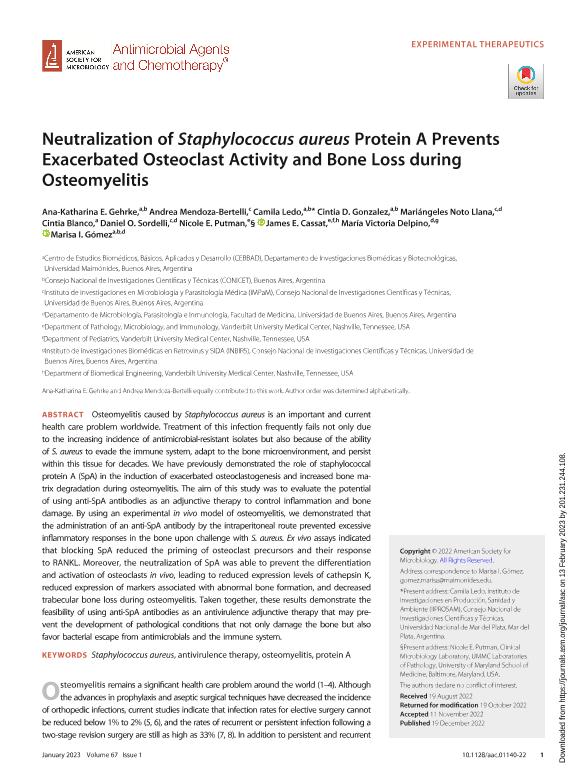Artículo
Neutralization of Staphylococcus aureus Protein A Prevents Exacerbated Osteoclast Activity and Bone Loss during Osteomyelitis
Gehrke, Ana-katharina Elsa ; Mendoza Bertelli, Andrea Cristina
; Mendoza Bertelli, Andrea Cristina ; Ledo, Camila
; Ledo, Camila ; Gonzalez, Cintia Daniela
; Gonzalez, Cintia Daniela ; Noto Llana, Mariangeles
; Noto Llana, Mariangeles ; Blanco, Cintia; Sordelli, Daniel Oscar
; Blanco, Cintia; Sordelli, Daniel Oscar ; Putman, Nicole E.; Cassat, James E.; Delpino, María Victoria
; Putman, Nicole E.; Cassat, James E.; Delpino, María Victoria ; Gómez, Marisa I.
; Gómez, Marisa I.
 ; Mendoza Bertelli, Andrea Cristina
; Mendoza Bertelli, Andrea Cristina ; Ledo, Camila
; Ledo, Camila ; Gonzalez, Cintia Daniela
; Gonzalez, Cintia Daniela ; Noto Llana, Mariangeles
; Noto Llana, Mariangeles ; Blanco, Cintia; Sordelli, Daniel Oscar
; Blanco, Cintia; Sordelli, Daniel Oscar ; Putman, Nicole E.; Cassat, James E.; Delpino, María Victoria
; Putman, Nicole E.; Cassat, James E.; Delpino, María Victoria ; Gómez, Marisa I.
; Gómez, Marisa I.
Fecha de publicación:
12/2022
Editorial:
American Society for Microbiology
Revista:
Antimicrobial Agents and Chemotherapy
ISSN:
0066-4804
Idioma:
Inglés
Tipo de recurso:
Artículo publicado
Clasificación temática:
Resumen
Osteomyelitis caused by Staphylococcus aureus is an important and current health care problem worldwide. Treatment of this infection frequently fails not only due to the increasing incidence of antimicrobial-resistant isolates but also because of the ability of S. aureus to evade the immune system, adapt to the bone microenvironment, and persist within this tissue for decades. We have previously demonstrated the role of staphylococcal protein A (SpA) in the induction of exacerbated osteoclastogenesis and increased bone matrix degradation during osteomyelitis. The aim of this study was to evaluate the potential of using anti-SpA antibodies as an adjunctive therapy to control inflammation and bone damage. By using an experimental in vivo model of osteomyelitis, we demonstrated that the administration of an anti-SpA antibody by the intraperitoneal route prevented excessive inflammatory responses in the bone upon challenge with S. aureus. Ex vivo assays indicated that blocking SpA reduced the priming of osteoclast precursors and their response to RANKL. Moreover, the neutralization of SpA was able to prevent the differentiation and activation of osteoclasts in vivo, leading to reduced expression levels of cathepsin K, reduced expression of markers associated with abnormal bone formation, and decreased trabecular bone loss during osteomyelitis. Taken together, these results demonstrate the feasibility of using anti-SpA antibodies as an antivirulence adjunctive therapy that may prevent the development of pathological conditions that not only damage the bone but also favor bacterial escape from antimicrobials and the immune system.
Palabras clave:
ANTIVIRULENCE THERAPY
,
OSTEOMYELITIS
,
PROTEIN A
,
STAPHYLOCOCCUS AUREUS
Archivos asociados
Licencia
Identificadores
Colecciones
Articulos(IMPAM)
Articulos de INSTITUTO DE INVESTIGACIONES EN MICROBIOLOGIA Y PARASITOLOGIA MEDICA
Articulos de INSTITUTO DE INVESTIGACIONES EN MICROBIOLOGIA Y PARASITOLOGIA MEDICA
Articulos(INBIRS)
Articulos de INSTITUTO DE INVESTIGACIONES BIOMEDICAS EN RETROVIRUS Y SIDA
Articulos de INSTITUTO DE INVESTIGACIONES BIOMEDICAS EN RETROVIRUS Y SIDA
Articulos(SEDE CENTRAL)
Articulos de SEDE CENTRAL
Articulos de SEDE CENTRAL
Citación
Gehrke, Ana-katharina Elsa; Mendoza Bertelli, Andrea Cristina; Ledo, Camila; Gonzalez, Cintia Daniela; Noto Llana, Mariangeles; et al.; Neutralization of Staphylococcus aureus Protein A Prevents Exacerbated Osteoclast Activity and Bone Loss during Osteomyelitis; American Society for Microbiology; Antimicrobial Agents and Chemotherapy; 67; 1; 12-2022; 1-11
Compartir
Altmétricas



